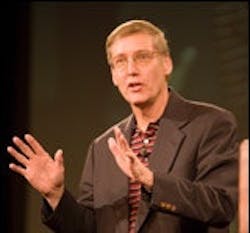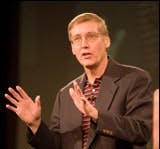A Lesson in Leadership from Pastor Dave
Dave Beckmann, retired Emerson vice president of marketing, leaned on his training as a Presbyterian minister to deliver a classic three-point sermon on The Engineer Revolution during his plenary talk today. These three points, Beckmann said, are the clear indicators of to the revolution in engineering happening throughout the worldnot just in process automation.
It isnt money or freedom or being listened that motivates people in their work: it is significance. David Beckmann, Presbyterian pastor and retired Emerson marketing exec, offered his insights on todays changing workforce.
Its about creating a revolution in your own space, Beckmann said.
Global demand for technology and resources is growing at a historically high rate, he said, and it is highly unlikely that the process industry will follow housing off the cliff. Not only will the expansion in Asia-Pacific not threaten North American jobs, he contended, but there is plenty of industry and capacity here for the foreseeable future.
Things are not entirely rosy, however. Project capital costs are at all time highs, and the price of oil has a built-in risk price premium of about $25/bbl over the actual price of oil. So, $50/bbl oil is selling for $75/bbl. This is entirely due to the unsettled conditions in the prime oil producing countries in the Middle East, Africa, Asia and South America.
The Canadian oil-sand fields appear to be part of the answer to the projected $100/bbl price of oil, but while exploration costs are low, extraction costs are still very high. We are globally stretched, and it is becoming nearly impossible to find the easy-to-refine sweet crudes, he warned. Most stocks are now high-sulfur and highly acidic, requiring further refining and processing.
The challenge is clear and obvious, said Beckmann.
The technology is here, as well, he said. PlantWeb architecture revolutionized an industry and made the technologies necessary to work in this globalized environment not only possible, but easy.
But, Beckmann warned, We face two key issues going forward. We have increasingly complex technology necessary to run our manufacturing operations, and we have an aging workforce unequipped to make fundamental changes to the process.
Weve shifted away from a labor-based economy, Beckmann added. As Peter Drucker said, You are today where your thoughts have brought you; you will be tomorrow where your thoughts take you; you cannot escape the results of your thoughts.
Shift to the Knowledge Worker
Beckmann went on to note that in the book, Good to Great by Jim Collins, one of the key differences separating great companies from those mired in mediocrity was their culture of discipline. It is time, he said, to transition from laborer to knowledge worker.
Knowledge workers are different, Beckmann said. They do not refer to themselves as workers, but as professionals. They identify themselves by their profession rather than who they work for. They are highly mobile, switching employers many times. They are nonhierarchical, and they see their job as their life.
It isnt money or freedom or being listened to or any of the other major reasons to work that people list that makes a job fun. It is significance. It is the chance to contribute to something important, greater than oneself, and that might even change the world. Thats what knowledge workers have wanted, and thats what employers need to give them in the future.
Beckmann cited examples of this kind of paradigm shift in companies from Rochester Utilities to Porsche AG.
What gave the latter example a special piquancy was the presence in the audience of former Porsche CEO Peter Schutz, who became the leader of Porsche in 1981 and by 1987 had rescued the company from the brink of bankruptcy. Schutz is also presenting at Emerson Exchange, and he and his wife came to listen to Beckmanns talk.
Beckmann told the story of how Schutz rescued Porsche through the metaphor of the incredible string of victories Porsche won at Le Mans from 1981 to 1987. Beckmann quoted Schutz statement: We are never going to a race we dont expect to win.
Somehow, Beckmann said, we have to bring workers out of the old paradigm of employee-as-servant, company-as-master, to a new paradigm where the means of production is knowledge, which is owned by knowledge workers. Instantly available information provides for global outsourcing, he added.
People want to be part of something greater than themselves. They want to do something that makes a positive difference in the world. Most employees do not consider making a profit for themselves sufficient to satisfy this goal. Beckmann quoted Clarence Darrow: The shareholder puts his money into the business and the workman his life. The one has as much right as the other to regulate the business.
This takes leadership. Leadership, said Beckmann, is nothing more and nothing less than influence. The leader must create the vision and plant the vision. Both leaders and followers resist change if the idea is not theirs. Participation increases ownership.
Leadership is ownership and following. Leaders, Beckmann noted, arent the lead sled dog. They ride on the back of the sled, guiding the dogs to go where they should.
Leadership is character, too. The leader establishes Moral Leadership. The company will take on the character of the leader. The leaders role is both to articulate and to be the values of the organization, Beckmann said. He quoted Bear Bryant, A leaders character is far more important than his or her skills, and St. Francis of Assisi, Go and teach values every day and, if necessary, use words.
Beckmann reiterated his sermons three points: Unless there is a test, there is no need to change the status quo; it takes technology to compete; and the most important element in the formula is the talent of ordinary people motivated to succeed.
This is an Engineer Revolution, he said, Are you ready?


